Why do 80% of retail investors lose money in a bull market? Because they sell low and buy high, chasing highs and cutting losses.
According to statistics, in the last bull market, 190 million retail investors collectively made 6.7 billion. You might say, 6.7 billion is not a small amount; I could get a small share of that and marry a freshly graduated university student! But don't be too happy yet. Retail investors are divided into big fish and small fish; those with accounts over 500,000 made a total of 254 billion, while those with accounts under 500,000 lost a total of 250 billion. Do you see the problem? Trading itself does not create wealth; it is merely a process of wealth redistribution.
And the bull market only served the purpose of mixing drinks.
What does it mean? Alcohol gives courage to the timid!
It turns out that you have never touched trading; after finishing this bottle of wine, you boldly take out half of your savings to invest in the trading market. This is the courage that alcohol gives the timid.
It turns out that you have always been lightly invested; after finishing this bottle of wine, you boldly sold your house and car, investing heavily. This is the courage that alcohol gives the timid.
But after sobering up, you will still sell low and buy high, still chase highs and cut losses, remaining the same as ever. The reason the ugly duckling can turn into a swan is that it was always a swan at heart; others can make money in the trading market because regardless of the market conditions, they know where to buy low and sell high, just that they happened to make money in the bull market that you witnessed. And you! Even if placed in a bull market, it is hard for you to make money; don't be indignant! Let me give you an example; see if this is not your own experience.
If I tell Zhang San that his PDD can rise from $2 to $1000, and that it will truly rise to $1000 in the future, he just needs to hold firm and sell at $1000 to achieve financial freedom.
Now the question arises, when it rises to $4, do you think Zhang San will sell? Of course, he will, because Zhang San is afraid; he will think to himself, I'm just an ordinary guy, how can you trust what I say? $4 might be seen by Zhang San as the peak of this bull market, and if he doesn't sell now, he might get trapped! So Zhang San sells PDD at $4, doubling his investment, and buys a big gold bracelet for his wife and a brand new iPhone for his daughter.
But the market did not move according to Zhang San's expectations. After Zhang San liquidated his position, PDD did not fall but instead rose to $10, then $100, and then $1000! At that point, will Zhang San buy back? Of course, he will, and he will buy even more! Because Zhang San is greedy; since he could make money the first time, he believes he can make money the second time as well. And this is a bull market! Not to mention that next door, Old Wang and Company Xiao Li are also making money on their second round! So Zhang San takes out 80% of his cash and buys PDD again at a high price.
Yet the market did not meet Zhang San's expectations. After buying back, PDD fell again and again, from $1000 to $100, do you think Zhang San will cut his losses and leave decisively? Of course not! Because Zhang San is both fearful and greedy; he fears his wife will find out he has lost all the tuition for his daughter’s tutoring classes, while also dreaming of the future's poetry and distant places. So Zhang San doubles down, secretly pledging his house to raise funds and frantically averaging down.
This time, Zhang San was wrong again. The market still did not move according to his expectations. The PDD he held plummeted from $100 to $50, then to $30, and then to $10.
So do you understand why Zhang San sells low and buys high now? Is the market targeting Zhang San? Is the market not moving according to his expectations? The truth is that this piece of the trading pie is not meant for someone like Zhang San, who knows nothing. I emphasize again, trading itself does not create wealth; it is merely a process of wealth redistribution. So who can Zhang San, as a small investor, make money from? And who can make money from small investors like Zhang San?
For example, it's like grabbing a stool; the rules are simple. When the music stops, whoever grabs one of the two stools on stage is the final winner. It sounds easy, but when you confidently step onto the stage, you are shocked to find your opponents are 1.88 meters tall and weigh 107 kilograms, like Schwarzenegger, along with several other strongmen over 1.80 meters.
Think about it, is trading like this? Although the rule for making money is to buy low and sell high, the ones eyeing the market are the institutional investors, the funds, and thousands of retail investors like you.
So, you might ask, why do we still trade cryptocurrencies? Why do we still engage in trading? By your logic, isn’t there no way out?
Not right!
Although it's difficult for you to earn money from institutions and speculative funds, can you earn money from other retail investors?
Although you can't outpace Schwarzenegger, can you at least grab a stool before a few others?
When you encounter danger in the forest and worry about being eaten by a bear, although you can't outrun a black bear, can you run faster than your companions?
Big fish eat small fish; a small fish can't just sit and wait to be eaten by the big fish! It must find a crack in the rocks to hide, eat some shrimp, and some seaweed.
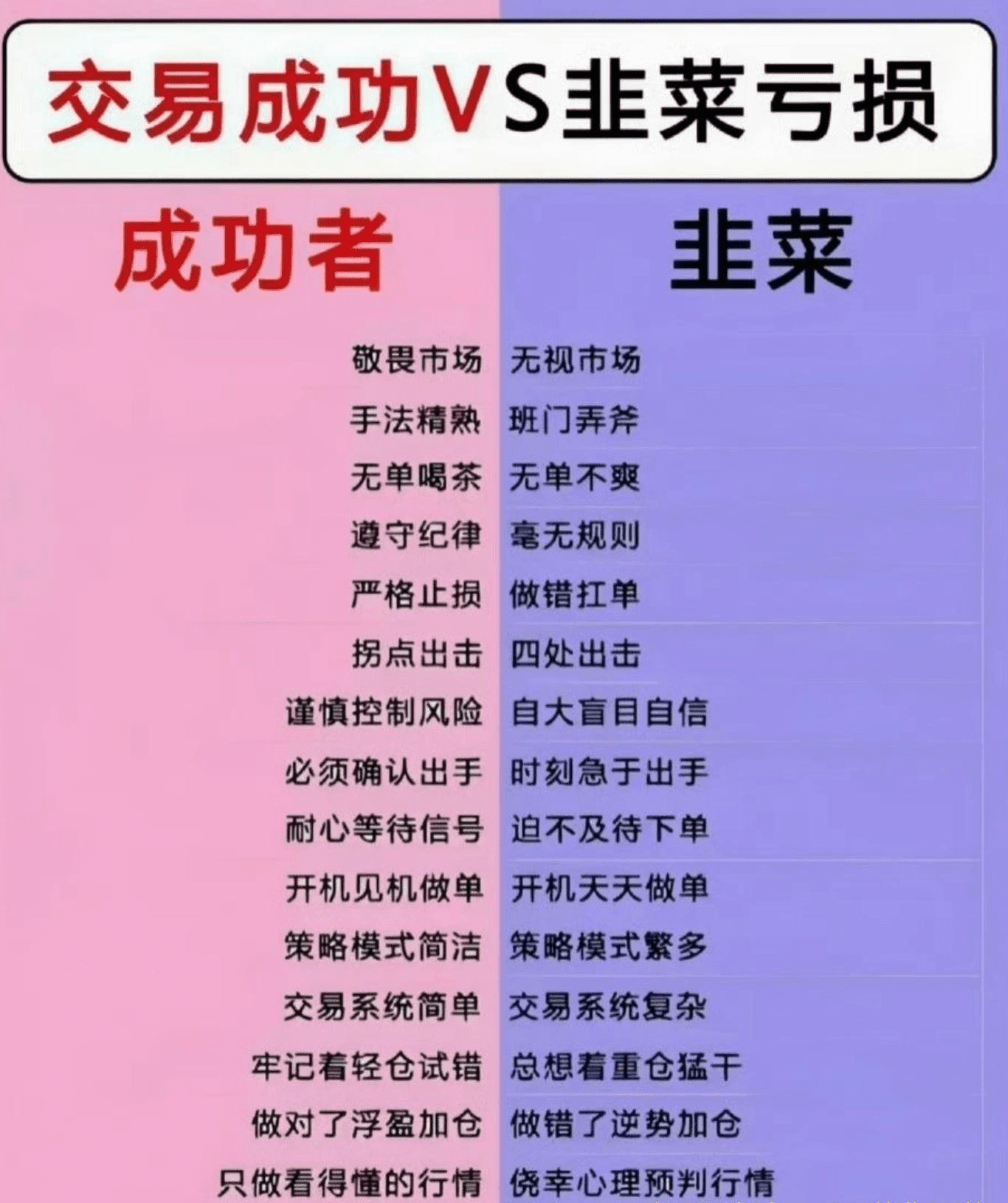
Entering the market from 50,000 to 100,000, then to 302,000, the third year reached 590,000, and in the fourth year, it rose to 3.78 million in August and over 7 million in November.
Until a few years ago, I could easily withdraw 30 million in the cryptocurrency market.
During that time, I fell to the bottom. At my peak, I reached about 4 million; at that moment, I thought I could be considered a big player in the crypto space. I resolutely quit my job and focused on trading cryptocurrencies, even borrowing money to trade. However, reality gave me a hard slap in the face. The financial crisis made me not only give back all my profits but also left me with a pile of debts, ultimately forcing me to sell my house, and my husband almost left me.
That time was my darkest moment. In just a few months, I fell from the peak to the bottom. But it also made me realize that the previous smooth sailing was not without an element of luck.
Thus, I feel that if I truly want to continue on the path of trading, I must dedicate myself to learning. Apart from understanding the fundamentals, I should also analyze news and study technical indicators. Without in-depth research and reasonable planning to manage my finances, my capital will eventually be exhausted. In the end, as a retail investor without any foundation, I will only joyfully enter the market and leave in disappointment.
In the following three years, I cut off all contact with classmates and friends, stayed home day and night reviewing my trades, and when I got tired, I would sleep on the keyboard. After much hard work, I finally achieved financial freedom through trading cryptocurrencies.
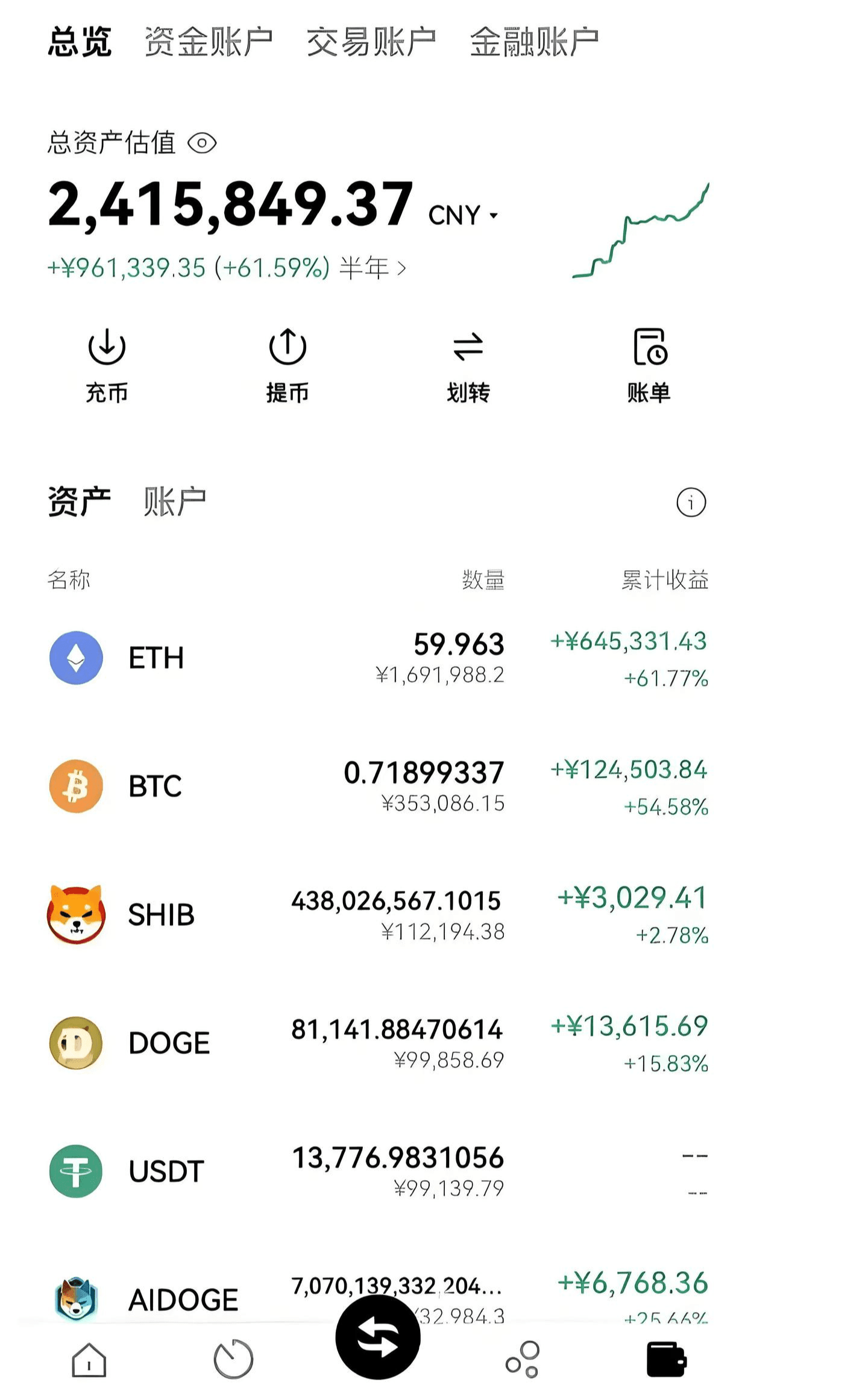
After ten years of ups and downs in the cryptocurrency market, I have distilled six invincible rules, concise and invaluable. If you intend to develop long-term in the crypto space, you must savor this insight; it will become a guiding light on your journey, helping you avoid detours and is worth cherishing.
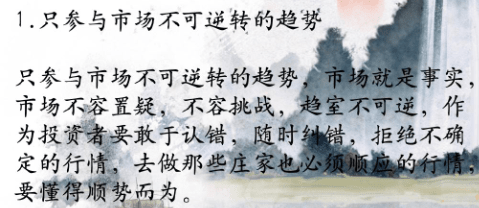
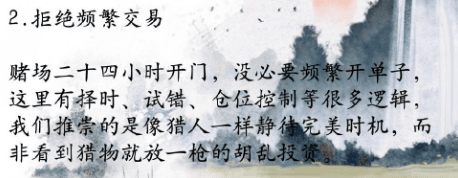
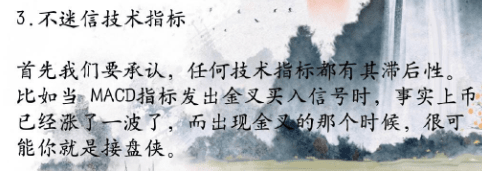

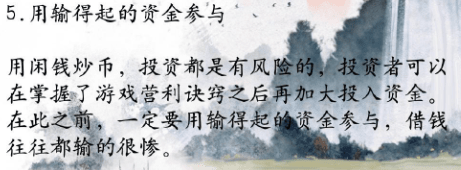
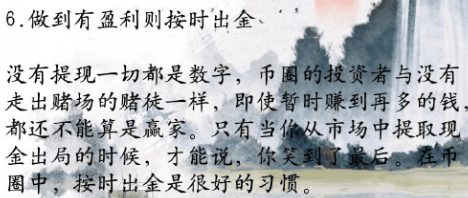
Here, I want to emphasize that the journey of trading cryptocurrencies often challenges the limits of human nature. It is essential to cultivate independent insights and face fears with reverse thinking. Only then can fear dissipate. When faced with a difficult choice, it might be wise to bravely choose the path you have never taken; the scales of victory will tilt in your favor.
Once you muster the courage to take that decisive step, you have already moved toward the shores of success. Remember, destiny is an excuse for the weak, and luck is the humility of the strong. Only by proactively seizing opportunities and facing life with a positive attitude can you rewrite your destiny. Destiny is never biased but always favors those who live earnestly and strive relentlessly.
The market will not punish you, but it will certainly teach you.
Some say the market is the fairest teacher. It will not punish you for making mistakes, but will repeatedly give you the same lessons until you truly learn.
There are no 'secrets' in trading; there are no 'shortcuts' in the market.
Many people think that the method to make money is hidden in some mysterious book or held by top traders. But in fact, all the answers are right in front of you: trends, support and resistance, money management, execution... The essence of trading is merely to do these simple things to the utmost.
Instead of struggling to predict, it's better to focus on the present.
Those who try to guess market fluctuations every day often end up either blowing up their accounts or doubting themselves. The key to trading is not prediction but execution. You cannot control whether the next trade will be a win or a loss, but you can ensure that by consistently adhering to your trading rules, your win rate will naturally be on your side.
Profit relies on patience, and losses require decisiveness.
When entering the market, who doesn't want to 'make money without loss'? But the truth about trading is: you must accept losses to truly make money. Losses themselves are not scary; what is scary is stubbornly holding onto losses without admitting defeat. Genuine profit is not achieved through frequent trades but by seizing the right market conditions and patiently holding onto profits.
The more frequently you watch the market, the faster you might lose money.
Many mistakenly believe that closely watching the market and frequent trading will increase their win rate. But in reality, this only leads to increased anxiety, making it harder to control one’s hands. Those who truly make money often know how to maintain distance, waiting for the market to provide opportunities rather than frantically chasing every fluctuation.
The more stable the trading, the more 'boring' life becomes.
True experts do not rely on passion and impulse but on discipline and patience. For them, trading is a monotonous process of repeatedly executing strategies—rules unchanged, mindset steady, not elated by profits or devastated by losses. They are more like calm executors rather than impulsive gamblers.
Living long in the market is more important than running fast.
Trading is like a marathon; those who win in the end are not the fastest runners but those who can endure to finish the race. Those eliminated by the market are not unintelligent; they simply did not survive. True experts are most concerned not with immediate profits but with how to control risks, maintain rhythm, and always ensure they qualify to continue playing.
Finally, I want to say: trading is not the market testing you; it is you who is cultivating yourself.
The market will not reward your diligence, nor will it excessively favor you just because you work hard. It remains unchanged; the only thing that can change is you.
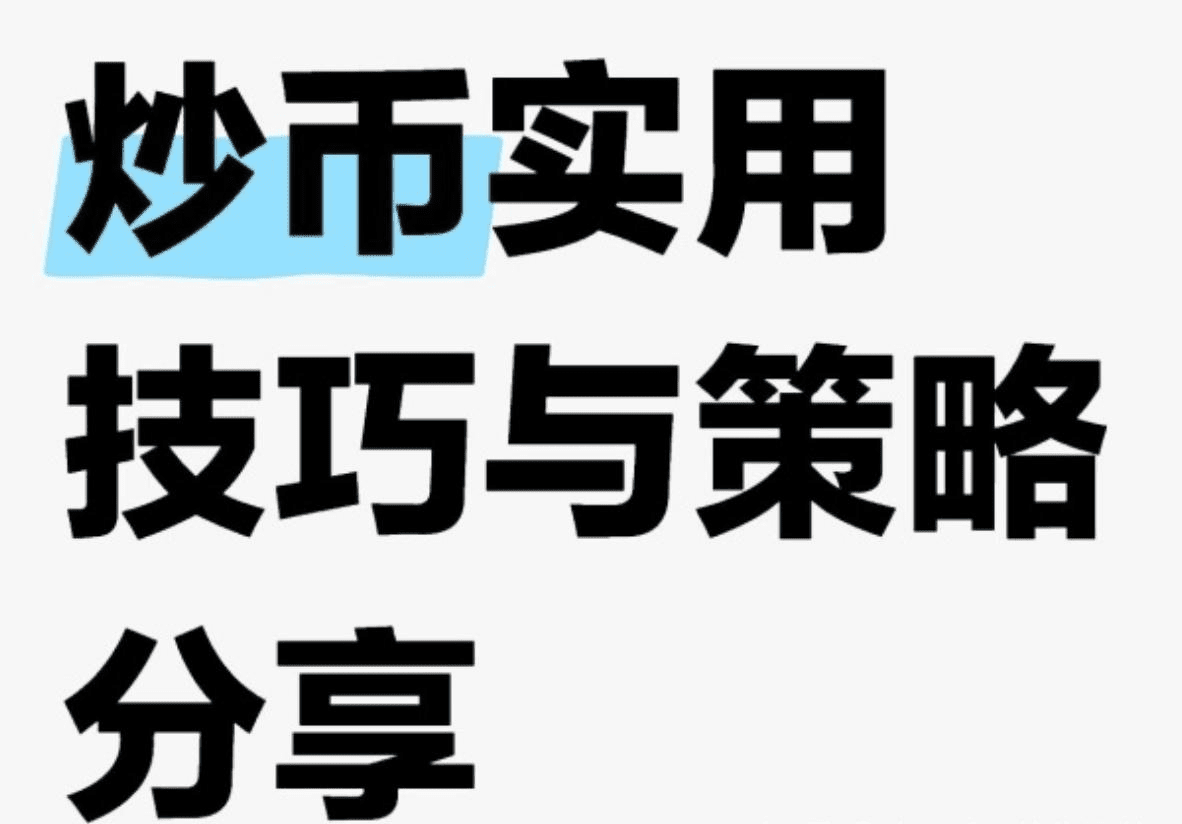
Believe me, knowing many principles does not necessarily mean you will lead a good life.
Understanding is it a deep sense within? Or is it just a superficial understanding? Is it derived from practical experience, or just something heard? A surface-level understanding is merely the extent to which I've heard a phrase, without deep thinking through the brain, being stingy to use thought for judgment. Such understanding is indeed useless to you and will ultimately validate the saying 'cannot live a good life.'
Trading is not just about understanding the principles to make a profit; it must start with a plan. Success begins with planning; without a plan, you are planning to fail.
In trading, failing to maintain consistent operations stems from ignorance. Therefore, actions are merely ideas, and executing them is just an empty fantasy. Analyzing from a fundamental perspective, it is mainly because you do not understand the rules of your operations, do not comprehend the likelihood of stop losses occurring, or the overall profitability, which leads to losing confidence in the system after several losses, prompting you to start doubting and seeking another system. This cycle continues; human nature is such. Failing to achieve consistency in trading ultimately reflects an insufficient understanding of your profit logic, the robustness of the system, and a lack of adequate drawdown and confidence to handle potential losses when the system encounters unsuitable market conditions.
You need to understand your trading logic. What kind of money can you earn? When is it a bad idea for you to try? What are the reasons for losing money? For me, it's about going against the trend with small cycle breakouts. Testing the system's profitability probabilities, considering the maximum loss in extreme loss scenarios, once you understand and think clearly about these, you'll naturally achieve consistency. After more than a decade of trading cryptocurrencies, with increasing insights in swing trading, select the right mainstream themes within the backdrop of a rising trend, and hold onto valuable coins at low prices, victory will ultimately belong to you!
If you don't have a good circle in the crypto space and lack firsthand information, then I suggest you follow me to get on shore and welcome you to join the team!!!
#NewHighOfProfitableBTCWallets #USGDPDataOnChain #BinanceHODLerDOLO


